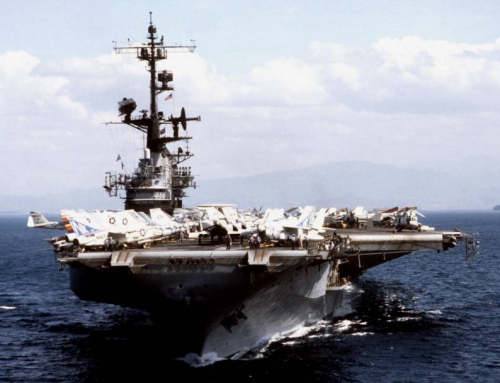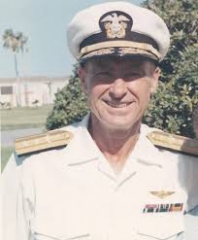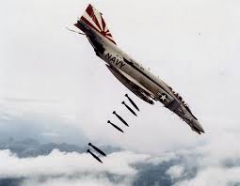“Richmond, this is an AUTOCRACY, not a democracy!”
There are some life experiences, stories, you do not tell. They are often clouded in a confusing mixture of pride and shame.
“You need to tell this story! It says so much about you,” my partner said last night, after hearing my very first telling of the story, to anyone, since it happened 36 years ago.
Here it is.

The USS Coral Sea, an aging, post WWII aircraft carrier, had left its Alameda, California home port jammed with a ship’s company and air wing of about 4,000 sailors, pilots, marines and about 80 aircraft, missiles, bombs, including a nuclear bomb; the aircraft mostly the famous F-4 A Phantom attack jet, and assorted onboard delivery planes and helicopters.
I was a Navy reservist, called to active duty, and assigned to the Coral Sea. I served in the Navy reserve to avoid being drafted.
My wife, Anne, and I had a small apartment across the Bay from Alameda, in the Twin Peaks area of San Francisco.
There were high expectations as we completed carrier “trials” and got underway for Pearl Harbor, Hawaii and then on to the Tonkin Gulf, to spend 7 months launching air strikes against North Vietnam targets, mostly the trails and railroads that were transporting North Vietnamese soldiers and equipment to fight the Americans in South Vietnam.
I did not believe in the war. I did not want to be there. No patriotic fervor.
I was assigned to the Aviation Supply Department, where we managed all the parts necessary to keep the planes flying. I had worked as a newspaper reporter before joining the Navy. But I sorted parts, moved boxes around, typed work orders in the Department’s office.
We had just steamed out of Pearl Harbor (known in the Navy simply as “Pearl”), when a friend of mine, an E-4 Second Class Petty Officer who was assistant to the full Commander of all ship supplies, shared a memo one evening. It revealed that the Coral Sea would only return to its home port of Alameda for a few days after the current 8 month deployment, and then head to Bremerton, Washington for two months of routine maintenance. It would deploy again off North Vietnam for 9 months.
I was incensed because there was a Navy Shipyard available to do the maintenance in San Francisco, and these orders meant that ship crew members, like myself, who had family living in Alameda, Oakland or San Francisco, would only have a few days with their family before the next deployment.
I decided to do something about it.
So, I wrote a long, uncritical, but questioning letter, addressed to the ship’s Captain. A friend in the Public Affairs Office, who edited the ship’s daily newsletter, copied and inserted my letter in about a thousand copies of the next newspaper, distributed through the ship early the next morning.
All hell broke loose.
Captain Ferris had every typewriter and every one of its keys, on the ship, checked in order to find out the location of the typewriter that had been used to write the original letter.
He started by examining every typewriter in “Officer’s Country,” on the ship, and told several officers: “I thought an officer had to write that letter. It was too well written for any enlisted person (to author).”
They tracked down the typewriter in the Aviation Supply department. They tracked me down in two days.
And I was literally dragged out of my chair up to the Captain’s at-sea quarters near the quarterdeck of the carrier.
The Captain stood, with two Marine security guards, before me. “RICHMOND,” he screamed, with face red and bushy eyebrows near waving in the breeze, “This is an AUTOCRACY, not a democracy!”
He was in charge. This was his ship. And he wasn’t going to put up with any letters like mine to the crew.
Strangely, I did not end up in the hole, the brig, far far down in the lower bowels of the carrier; with shaved head and guarded by Marines.
I received no punishment.
Strangely, The Captain had me transferred from Aviation Supply to Public Affairs, and made editor of the daily newspaper.
He went on speaker and told the crew that yes, we were going to Bremerton for repairs. But he promised there would be weekly free flights between Bremerton and San Francisco for those crew members who had family there, before we again deployed to the South China Sea.
He also grew to love the way I changed and edited the daily newspaper.
I started writing front page stories in the middle of each night; interviewing returning jet pilots about where the air strikes were done again North Vietnam; what the bombing results accomplished. What happened in terms of pilot returns and aircraft mechanical and weapon problems.
I also started writing short features with photos on all kinds of different ship mates – their family, their jobs on the carrier, how they felt about Navy service.
I added poetry to the newspaper that was submitted by crew members, and coverage of stateside news I thought important and of interest.
About three times a week, my phone would ring an hour or so after I’d distributed the daily newspaper very early in the morning. “HOLD FOR THE CAPTAIN!” his Marine guard would bark into the telephone.
And the Captain would come on, and want to chat about the newspaper content, the interviews, and the stories about crew members. “Great job, Richmond!” he’d say many times.
I went on to serve on the Coral Sea for two combat tours.
Captain Ferris left the ship after that tour, and was promoted to Rear Admiral – a rare promotion for an officer who had not graduated from the Naval Academy.
For all the ensuing years, I have kept track of Admiral Ferris.
He soon retired after his promotion, and lived out his life in Alameda, California. His obituary in 2006 noted that he had been a volunteer deliveryman for “Meals on Wheels” for more than 23 years after retirement.
A great man. A great leader who was loved by every shipmate.
And I?
Should I feel shame, or pride, for speaking out on behalf of myself and other shipmates on the Coral Sea, by writing that letter? By breaking Navy regulations.
“No, I really don’t feel shame,” is what I told my partner last night.
Thankfully, I left the Navy in 1970, to travel other life roads, that have always taken me back to the written word, and to watching and writing about people and life experiences and to speaking out when it seemed necessary.
But you never know what the consequences of doing so will be. Often far different than in this strange story of Navy service during the Vietnam conflict.